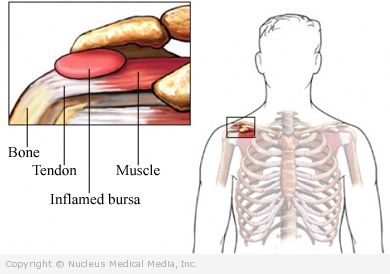Bursitis – Definition
Bursitis is inflammation of a bursa. A bursa is a thin, slippery piece of tissue that protects tendons. Tendons are the tissues that connect muscles to bones. The bursa reduces friction between the tendon and bone. It allows the tendon to glide easily over the bone.
There are many bursae in the body protecting underlying tendons. Bursitis most often occurs in the following joints:
- Shoulder
- Elbow
- Knee
- Hip
Bursitis – Causes
Acute bursitis may be caused by:
- A blow to an area containing a bursa
- Overexertion of a joint (eg, swimming a long distance or throwing a ball many times)
Chronic bursitis is usually caused by long-term overuse. The repeated motion of a muscle-tendon unit causes friction in the bursa. As the activity continues, the bursa becomes inflamed. It may fill with fluid. The bursa thickens and does not function well. Both bursa and tendon may become irritated.
Bursitis – Risk Factors
Factors that increase your chance for bursitis include:
- Repetitive motion activities when done to an extreme (eg, swimming, running, or tennis)
- Contact sports
- Sporting gear that does not fit well
Bursitis – Symptoms
Symptoms of bursitis include:
- Pain in the area of the bursa
- Swelling
- Reddened skin
- Warmth around the area of the bursa
- Decreased motion of the nearby joint
- Decreased function of the nearby limb
Bursitis – Diagnosis
The doctor will ask about your symptoms and your physical activities. The painful area will be examined. You may have an x-ray.
Bursitis – Treatment
Acute bursitis treatment may include some of the following:
- Resting the affected area
- Icing the painful area
- Taking anti-inflammatory medications
- Having a cortisone injection
- Protecting the area from trauma
Treatment for chronic bursitis may include:
- Stopping the activity causing pain
- Taking anti-inflammatory medications
- Protecting the bursa from trauma
- Having physical therapy, including exercising and applying heat
- Having a cortisone injection
- Undergoing surgery
Bursitis – Prevention
The following steps may help to prevent bursitis:
- Do not overdo sports and other activities.
- When doing a new activity, gradually increase the length of time you do it.
- Make sure you perform activities correctly.
- Wear protective pads if you play contact sports.

